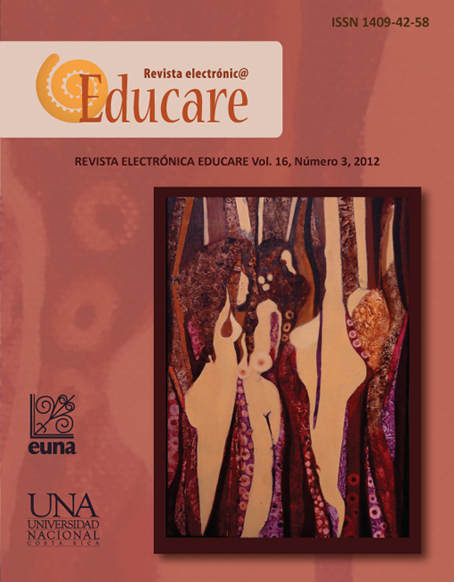Pedagogical Mediation for the Autonomy of Future Professionals in Teacher Training
DOI:
https://doi.org/10.15359/ree.16-3.2Keywords:
Teacher training, autonomy, pedagogical mediation.Abstract
This article studies the importance of pedagogical mediation in helping first-year students in the Teacher Training area to advance from intellectual heteronomy to intellectual autonomy. It explains some strategies and experiences implemented by the authors. It focuses on the need of paying attention to students in order to understand their expectations, opinions and previous experiences as a basis for developing different topics and concepts, to favor an actual free participation in the pedagogical mediation dynamics and, consequently, opportunities for students to express themselves with autonomy. The aforementioned strategies allow for the transition from a pedagogy centered on teaching to a pedagogy centered on learning, in such a way that the future educator becomes a protagonist in his/her formation and constructs his/her own intellectual identity, based on the concept of action-reflection-action. The authors of this article consider that the first year in higher education is a privileged opportunity to develop the autonomy of future teachers, and, as stated by Freire (2004), the respect for autonomy is an ethical imperative.
References
Assmann, H. (2002). Placer y ternura en la educación. Hacia una sociedad aprendiente. Madrid:
Narcea.
Barahona, H. (2011). Relación entre la autonomía y las experiencias educativas previas de los
actores curriculares encontradas en un contexto de educación superior de Bogotá,
Colombia. Entramado, 7(1), 114-127. Recuperado de http://redalyc.uaemex.mx/src/inicio/
ArtPdfRed.jsp?iCve=265420116008
Contreras, J. (1999). La autonomía del profesorado (2ª ed.). Madrid: Ediciones Nárcea.
Day, C. (2006). Pasión por enseñar. La identidad personal y profesional del docente y sus valores (2ª
reimp.). Madrid: Nárcea.
De Luca, C. (septiembre, 2009). Implicaciones de la formación en la autonomía del estudiante
universitario. Electronic Journal of Research In Educational Psychology, 7(18), 901-922.
Recuperado de http://www.investigacion-psicopedagogica.org/revista/new/
ContadorArticulo.php?325
División de Educación Básica, Centro de Investigación y Docencia en Educación, Universidad
Nacional. (2010). Plan de Estudios. Heredia, Costa Rica: Universidad Nacional.
Freire, P. (2004). Pedagogía de la autonomía. Saberes necesarios para la práctica educativa. Sao
Paulo: Paz e Terra. Recuperado de http://webdelprofesor.ula.ve/nucleotachira/oscarg/
materias/epistemologia/lecturas/freire.pdf
Hernández, A. (2012). Curso: Evolución de la Educación Preescolar. Licenciatura en Pedagogía
con énfasis en Preescolar. Universidad Nacional de Costa Rica. Centro de Investigación y
Docencia en Educación. División de Educación Básica.
Negrin, M. (diciembre, 2003). Saberes teóricos y práctica docente: Razones de un desencuentro.
Educación, Lenguaje y Sociedad, 1(1), 307-312. Recuperado de http://www.biblioteca.
unlpam.edu.ar/pubpdf/ieles/n01a19negrin.pdf
Pérez, L. (2012). Autonomía, solidaridad y reconocimiento intersubjetivo. Claves éticas para
políticas sociales contemporáneas. Revista de Estudios Sociales, 42, 13-26. Recuperado de
http://res.uniandes.edu.co/view.php/760/index.php?id=760
Sanjurjo, L. (2009). Los dispositivos para la formación en las prácticas profesionales. Argentina:
Homo Sapiens Ediciones.
Downloads
Published
How to Cite
Issue
Section
License
1. In case the submitted paper is accepted for publication, the author(s) FREELY, COSTLESS, EXCLUSIVELY AND FOR AN INDEFINITE TERM transfer copyrights and patrimonial rights to Universidad Nacional (UNA, Costa Rica). For more details check the Originality Statement and Copyright Transfer Agreement
2. REUTILIZATION RIGHTS: UNA authorizes authors to use, for any purpose (among them selfarchiving or autoarchiving) and to publish in the Internet in any electronic site, the paper´'s final version, both approved and published (post print), as long as it is done with a non commercial purpose, does not generate derivates without previous consentment and recognizes both publisher's name and authorship.
3. The submission and possible publication of the paper in the Educare Electronic Journal is ruled by the Journal’s editorial policies, the institutional rules of Universidad Nacional and the laws of the Republic of Costa Rica. Additionally, any possible difference of opinion or future dispute shall be settled in accordance with the mechanisms of Alternative Dispute Resolution and the Costa Rican Jurisdiction.
4. In all cases, it is understood that the opinions issued are those of the authors and do not necessarily reflect the position and opinion of Educare, CIDE or Universidad Nacional, Costa Rica. It is also understood that, in the exercise of academic freedom, the authors have carried out a rogorous scientific-academic process of research, reflection and argumentation thar lays within the thematic scope of interest of the Journal.
5. The papers published by Educare Electronic Journal use a Creative Commons License:














 The articles published by Educare Electronic Journal can be shared with a Creative Commons License:
The articles published by Educare Electronic Journal can be shared with a Creative Commons License: 



